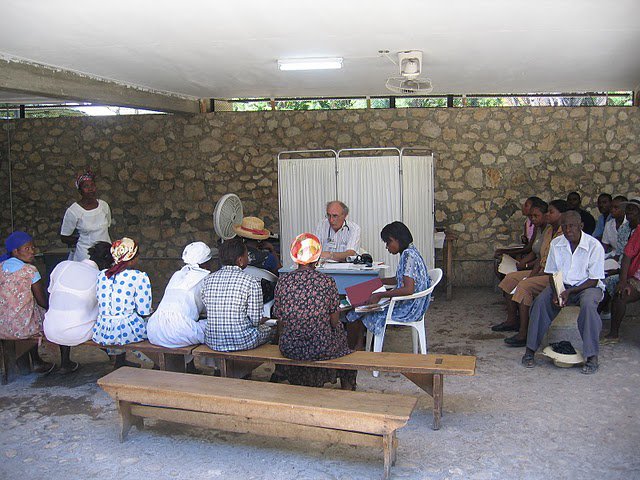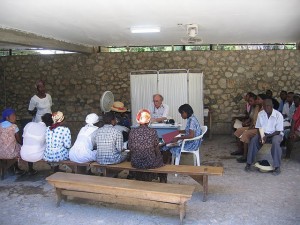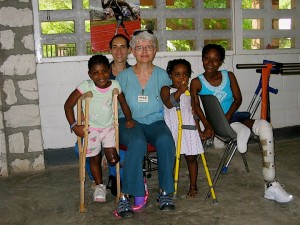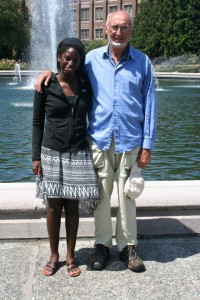
By Lynn West

When I meet people like Dr. James Fett, I am always struck by how little we know about our neighbors. Jim Fett and his wife, Therese Sprunger, Panorama residents since 2007, are definitely unsung heroes. Thousands of lives have been saved worldwide because of Fett’s research into the causes and prevention of Peripartum Cardiomyophathy (PPCM), but from his unassuming manner, you would never know the extent of his influence.
With PPCM, a pregnant woman’s heart enlarges and cannot provide sufficient blood to support the body. Perhaps if this deadly disease struck as many women in the United States as it does in Haiti, we would all be more aware of his breakthrough discoveries. Jim and Therese also have a vital, personal connection to PPCM.
As an internist, Jim has travelled the world serving those most in need. However, his time as Medical Director at Hopital Albert Schweitzer in Port a Prince, Haiti in 1984-86 would become a catalyst both in his personal and professional life.
In 1986, Fett left this position in Haiti to care for his wife, who died of a brain tumor at age 52. Toward the end of the 80s, he returned to Schweitzer as a volunteer. It haunted him that women in Haiti were ten times as likely to contract PPCM as women in the United States.
Jim first met Therese Spunger, a volunteer nurse from Switzerland, when he was medical director. Therese had assisted many women dying from PPCM, but one young mother carrying a very malnourished baby in her arms into the hospital would have a profound effect on the couple’s lives. In 1988, a woman brought a 3.5-pound baby, named Christine, to Hopital Albert Schweitzer. Christine was only one month old. “The dying woman sobbed and begged Therese to adopt Christine as she had no one to care for her,” Jim said.

After Jim and Therese married, they brought Christine to the United States. When they arrived at immigration, Jim said, “They gave her immediate citizenship as she had no one else in the world but the two of us.”
The Fett family settled in Aberdeen where Jim served in the Public Health Service as a Family Practice physician for the Quinault Indian Nation. After retiring in 1997, the lack of research into PPCM gnawed at him. He had maintained his relationship with Hopital Albert Schweitzer and discussed his interest in researching the disease with the administrators.
In 2000, with the help of volunteers, Fett began his study, returning to Haiti every three months.
Thinking back to Christine as an undernourished baby was the heart of his research. Remarkably, PPCM only affects the mother’s immune system; the infants are fine. However, seventy five percent of babies born to mothers who died of PPCM, never lived more than one year, often because of the lack of breast milk or the inability of caregivers to supply expensive formula.
“A picture of the problem began to form,” Fett said. “The Haitian women appear to have a genetic susceptibility to develop PPCM–as do those of African heritage anywhere in the world. We suspect that via the immune system, that susceptibility is augmented because of zinc deficiency in up to 1/3 of Haitian women in the vulnerable population living in poverty.”
“Combined with that, the women had many stresses on their hearts,” continued Fett. “They climbed steep hills, worked on farms, and carried heavy water jugs, for example.” In addition, the midwives who delivered the babies had little training in how to diagnose the disease.

“Zinc supplements are given to prenatal subjects in the hope that will augment the immune system and make them less vulnerable to this form of cardiomyopathy,” summarized Fett.
With treatment of zinc, folic acid and Vitamin A and additional midwife training, the mortality rate for the mothers in Haiti with PPCM dropped from 80% to 15%. In addition, previously only 4% of the mothers recovered in the hospital, but with the new treatment, 35% reached full recovery.
“Once medical centers saw some of our successes, other funding sources emerged,” Fett said. “Emory University in Atlanta saw our results and the progress we were making, and they wanted to join us.” Following that association in 2008, he joined Dr. Dennis McNamara of the University of Pittsburg in applying for one of President Obama’s National Health Institute’s Challenge Grants.
With this grant funding, Dr. Fett helped Dr. McNamara in the formation of IPAC (Investigations in Pregnancy Associated Cardiomyopathy) in which 30 medical centers with 120 cardiologists and other personnel in the United States and Canada followed a hundred women with PPCM. “Seventy to eighty percent of these women fully recovered,” Fett explained. Their cutting-edge research report will appear in the Journal of the American College of Cardiology in the August, 25 2015 issue.
Social media is now playing a role in the PPCM fight. Networks of survivors have been formed. An invitation only Facebook page, PPCM Survivor Support Group, has raised awareness of the disease and helped women by sharing information and support. “I am on that site a great deal, “ Jim told me. “They can learn from me and I can certainly learn from them.”
As often happens, our conversation soon turned back to family. Jim’s pride is evident as he talks about his wife’s work as an oncology nurse at Providence St. Peter Hospital, his older daughters’ accomplishments, and, of course, of Christine’s post-doctoral work at Columbia University in Ecology, Soils and Climate Change.
What a pleasure it has been to meet a member of our community who has been such a saving force for so many.


















































